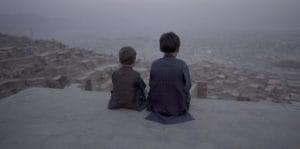
For me, the problem with watching the news every day is somehow every story has to have some political bent to it. Trump this…’eff Trump that. The peril of individual human lives is reduced to a rallying cry for votes in the next election. The Middle East is a lightning rod for Western Politics. People die by the hundreds, and we talk about whether the White House has control over it.
Director Aboozar Amini takes his cameras into Afghanistan in this documentary Kabul, City in the Wind, following three lives living day-to-day in a country that knows no rest. It started with the Russians, then the Taliban, and now ISIS, Amini attempts to document the deep-rooted effects of unrest in the lives of its people. Not too long before shooting the doc, dozens of Afghan citizen died when a suicide bomber attacked the local market.
We first meet Abas. He is a bus driver, who owns his bus. At the film’s open, he talks about looking back at life and experienced only 10% peace over its span. He hates his job as he is always trying to stay ahead of his expenses, especially as a loan payment is coming due and his bus is having mechanical problems. Upon reflection, he says, “I fear I may one day create a morass which could eat me and my family.”
Next, are two young brothers Afshin and Benjamin. Afshin has to be twelve and Benjamin eight or nine. Afshin is the man of the house as his father earns a living in Iran. His father was an officer and was one of two survivors after an attack on his division of 85 men. Thinking of his father, Benjamin sings a song throughout the film, “Yellow kitty stay home, don’t go to war. You may die.”

“…attempts to document the deep-rooted effects of unrest in the lives of its people.”
Amini follows the boys just looking for things to do, when not in school. Activities involve chores like removing rocks off their roof, watering trees, playing football with a can, shopping at the market for their mother, and fulfilling community service on behalf of their father. They also try to make money by selling whatever they can find, like shoes. Their greatest fear is a suicide bomber.
The pressure is mounting for Abas. He needs money, and a lot of it or his bus will be repossessed. Part of the problem is Abas undermined his own business to make some extra money, and that decision pretty much ruined his life. On the one hand, he has a very loving family, and on the other, the pressure to survive is mounting and depression and anxiety is going to get the best of him.
What’s missing with Armini’s documentary is a narrative of some sort. It needs some kind of story thread to follow, so audiences have a sense of direction. In spite of that, Armini’s intention is clear. He wants to connect us with the plight of the Afghan people, and he’s quite effective in doing so. Consider what your personal development goals are in the next two, five, or ten years. In Afghanistan, I don’t think anyone thinks that far ahead in life. It’s more like two day, a week, or a month.
You can’t help but feel their helplessness and anxiety of having to live not knowing what event will change their lives for the better or worse…mostly worse. There are moments when one of the three subjects reflect on their situation. It’s done in voice-over as the camera a framed tight on their faces. It’s haunting and powerful.

Kabul, City in the Wind (2019) Directed by Aboozar Amini. Kabul, City in the Wind screened at the 2019 San Francisco Film Festival.
7.5 out of 10 stars
